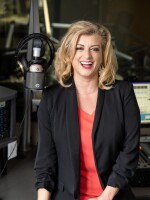I’m coasting along the ripples on the surface of the ocean and dive below, swimming through coral reefs and passing schools of fish. When I look up I can see the sun reflecting on the surface of the water, below me the sandy ocean floor and behind me the reef surrounds me.
But…I’m bone dry - because I’m doing all this...on dry land!
This is the AlloSphere. It’s a three-story metal sphere in an echo-free chamber. Think the Las Vegas Sphere but on a smaller scale.
Inside, screens fill my vision all around, as I am led on this immersive deep-sea dive by JoAnn Kuchera-Morin, the AlloSphere’s Director and a Professor of Media Arts and Technology.
"It's where you can have a group of researchers, a group of people come in and actually experience virtual reality in a new and different way as a group user experience instead of putting a helmet on your head. You're actually here in the space and we can bring in any space that you'd like to be in," said Kuchera-Morin.
The AlloSphere will host a series of public screenings of Sketches of Sensorium - immersive films which seek to answer a question.
"What are the implications of what's happening with climate change and ocean health?" said Kuchera-Morin. "And so what Sketches does is in the beginning you were looking at the earth and we were out from afar. And we have actually NASA's science data on that earth that will show you temperature change, show you ocean acidification, and then we'll zoom in to certain places in the ocean to show the ramifications of what's happening."
As well as the awe inspiring visuals, the immersive sounds of ship engine noises and other ocean sounds takes your senses to the environment it seeks to protect.
"Think about how we live on the planet. We use all of our senses in order to navigate through complex systems. All of our senses vibrate in frequency relationships. So we have an infrasound across between feeling and hearing," said Kuchera-Morin.
There’s a sweet spot where art and science meet. And that’s right here, says Kuchera-Morin, in this innovative space which started as an educational tool and is now challenging visitors into new thinking, insight and action.
"We do research with our scientists, but it's education among us, but it's also education that anyone can start to understand. And that's the whole idea of the AlloSphere, where if we can bring data up to human scale and we can work with that data and we can understand it in a way that you're not going to get from reading a science paper or a textbook," said Kuchera-Morin.
"We may find a different way to educate. These are the classrooms of the future, the immersive cinemas of the future, the interactive situations of the future. And as media artist, it's all to be able to do the most important things that we believe are really important in this world. That's compassion, that's understanding one another, that's equity, and that's climate justice," she said.
The Sketches of Sensorium at the Allosphere at UC Santa Barbara is open to the public on six Thursdays and Saturdays starting Thursday 12 September, and you need to sign up online in advance.



